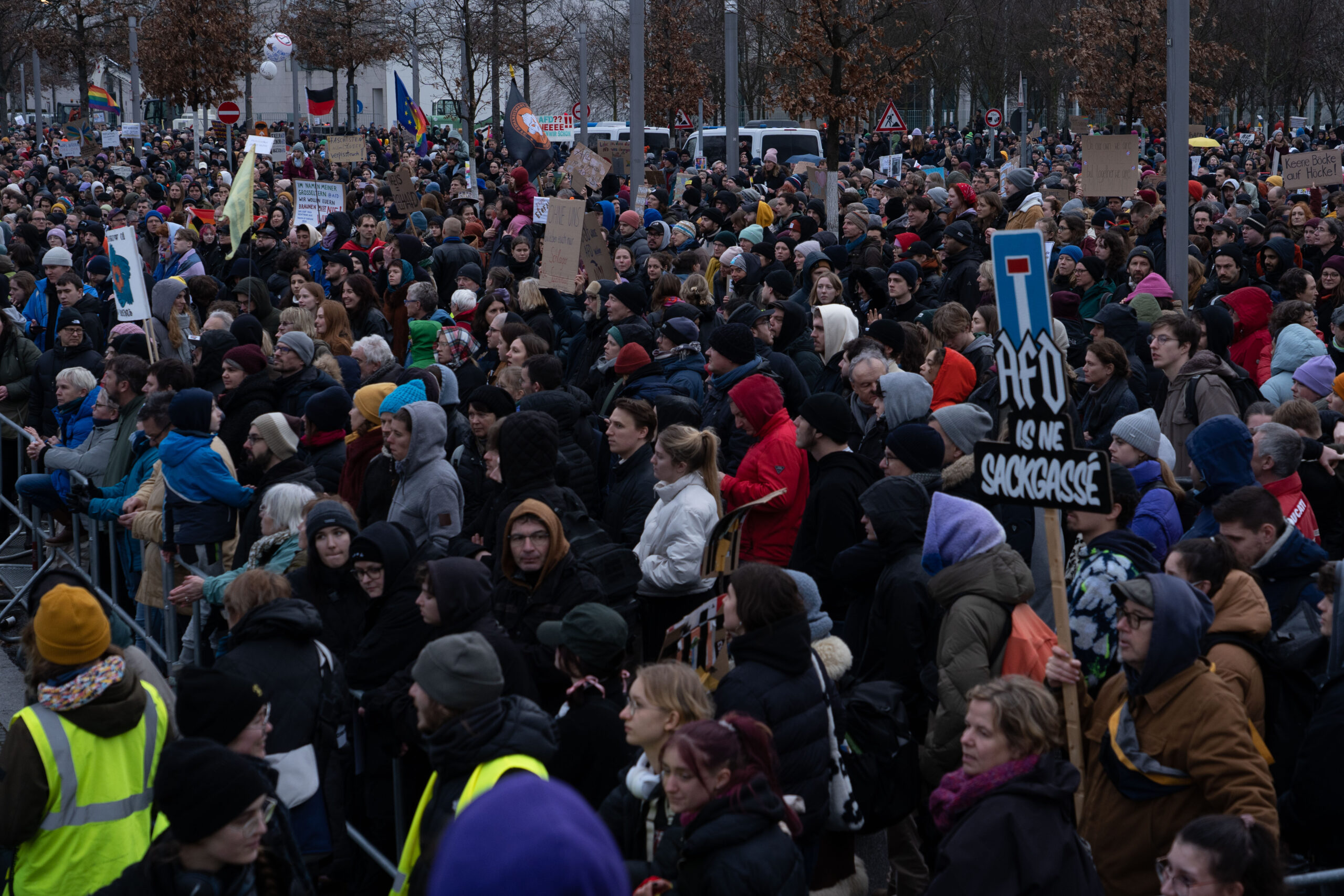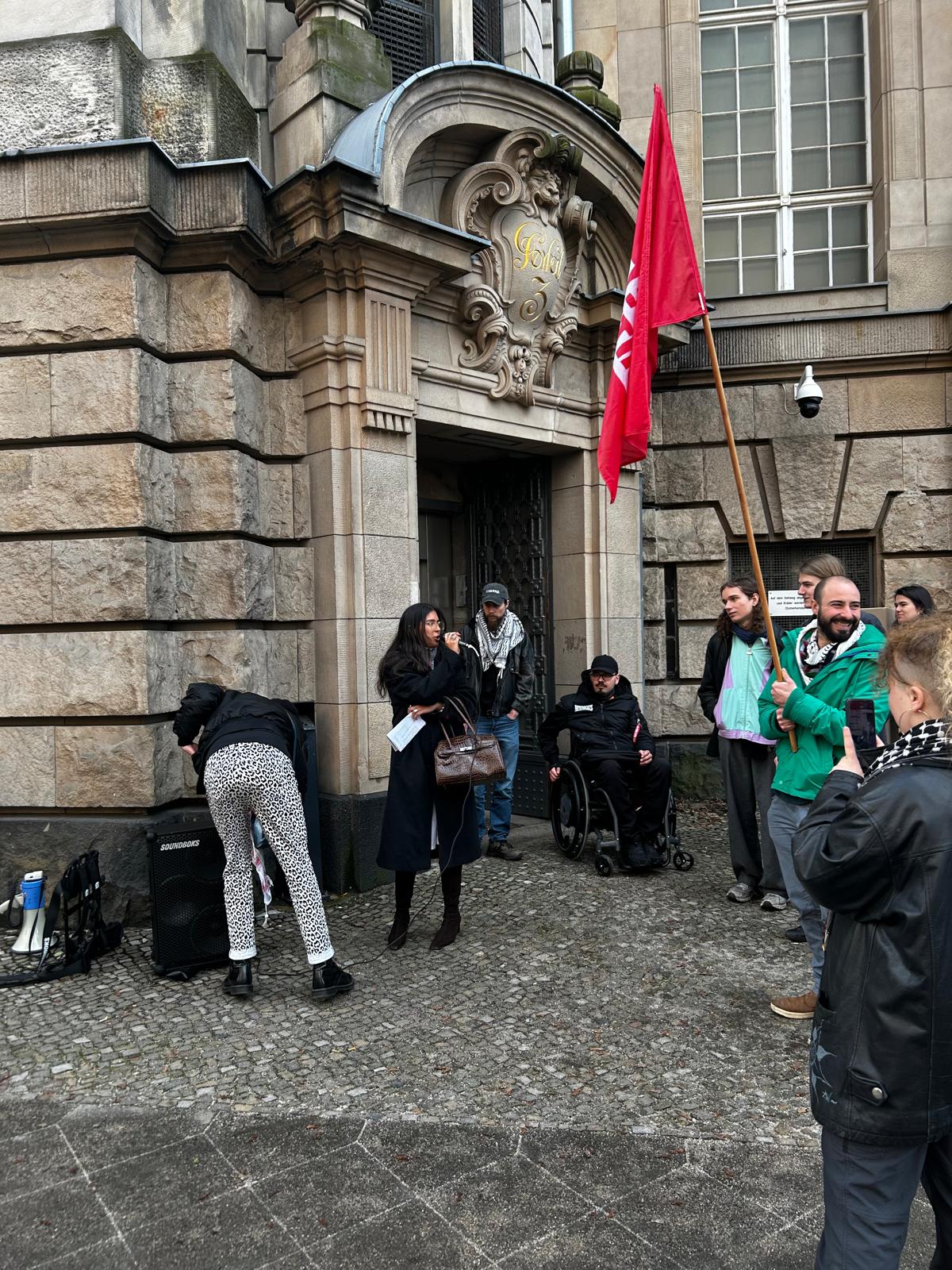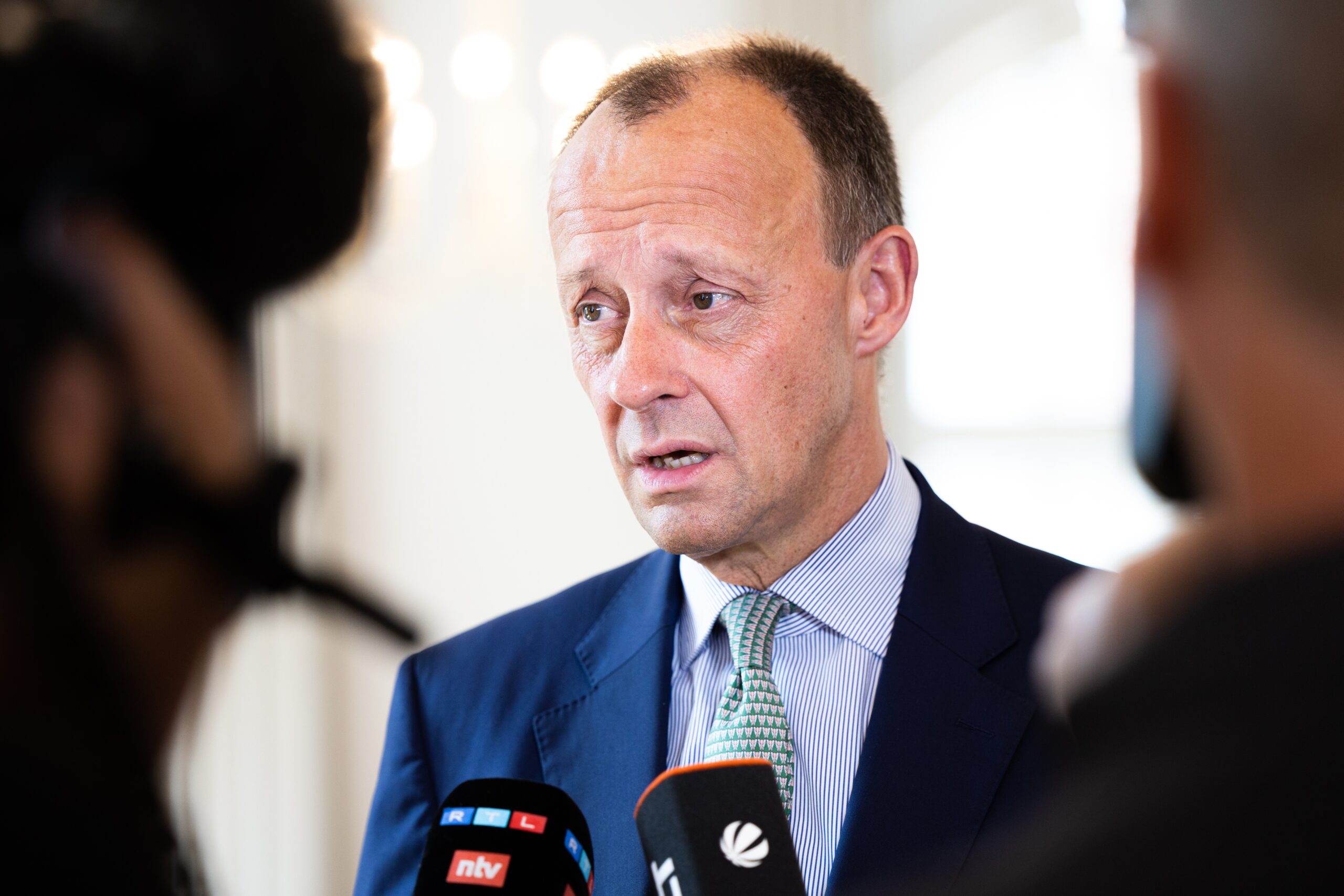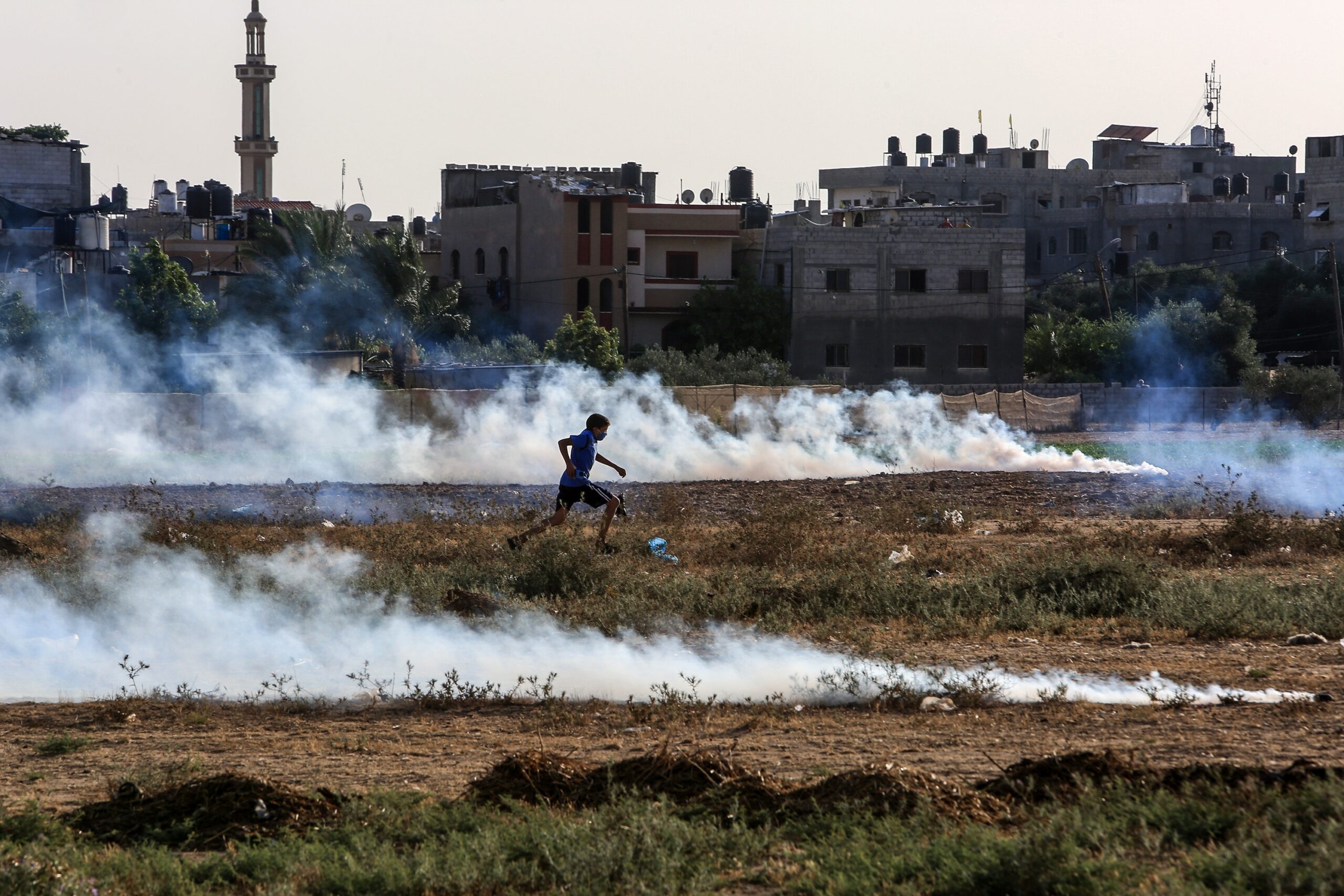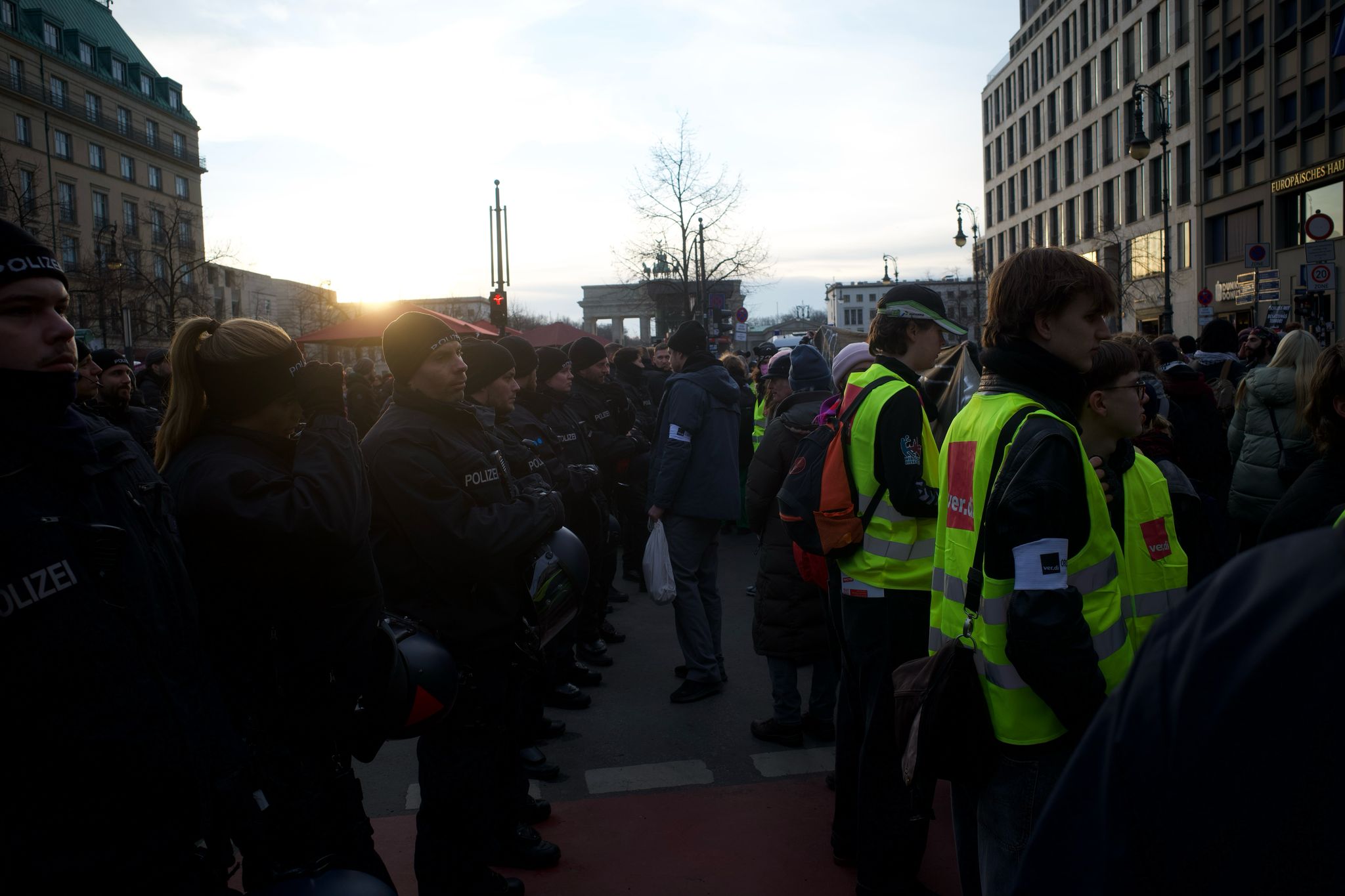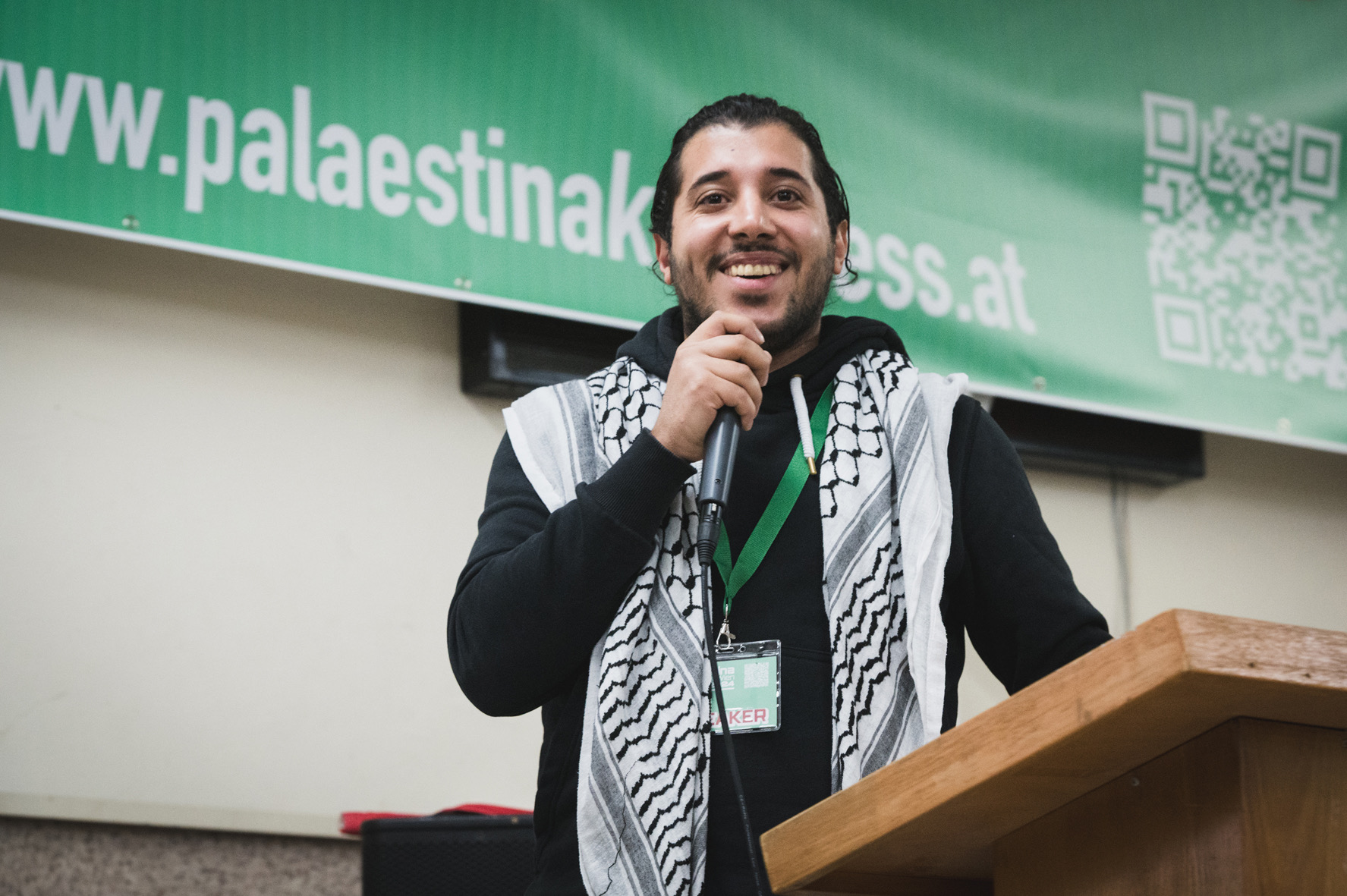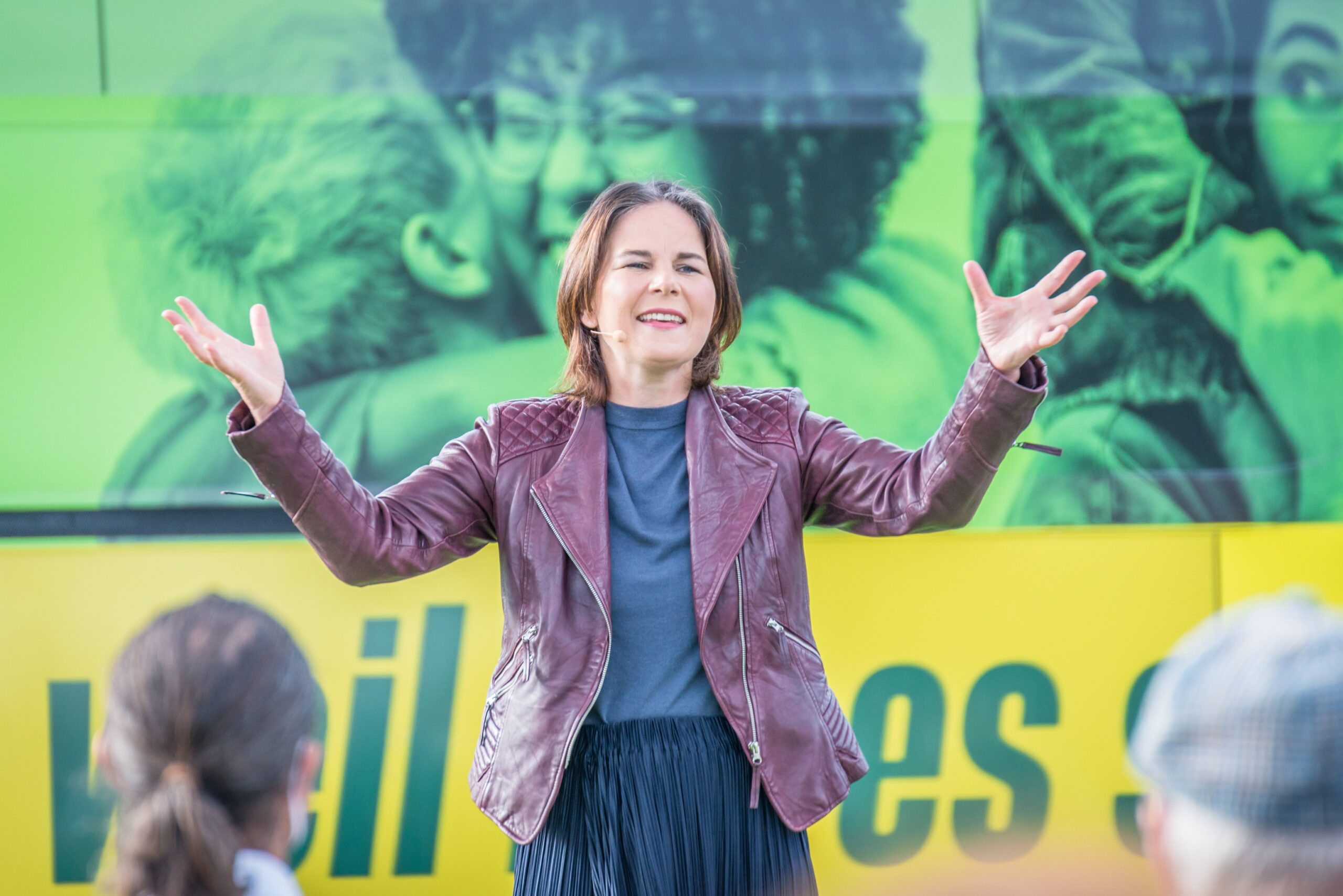Interview: Polizei greift Juden an, nachdem er sich kritisch zum Zionismus äußert
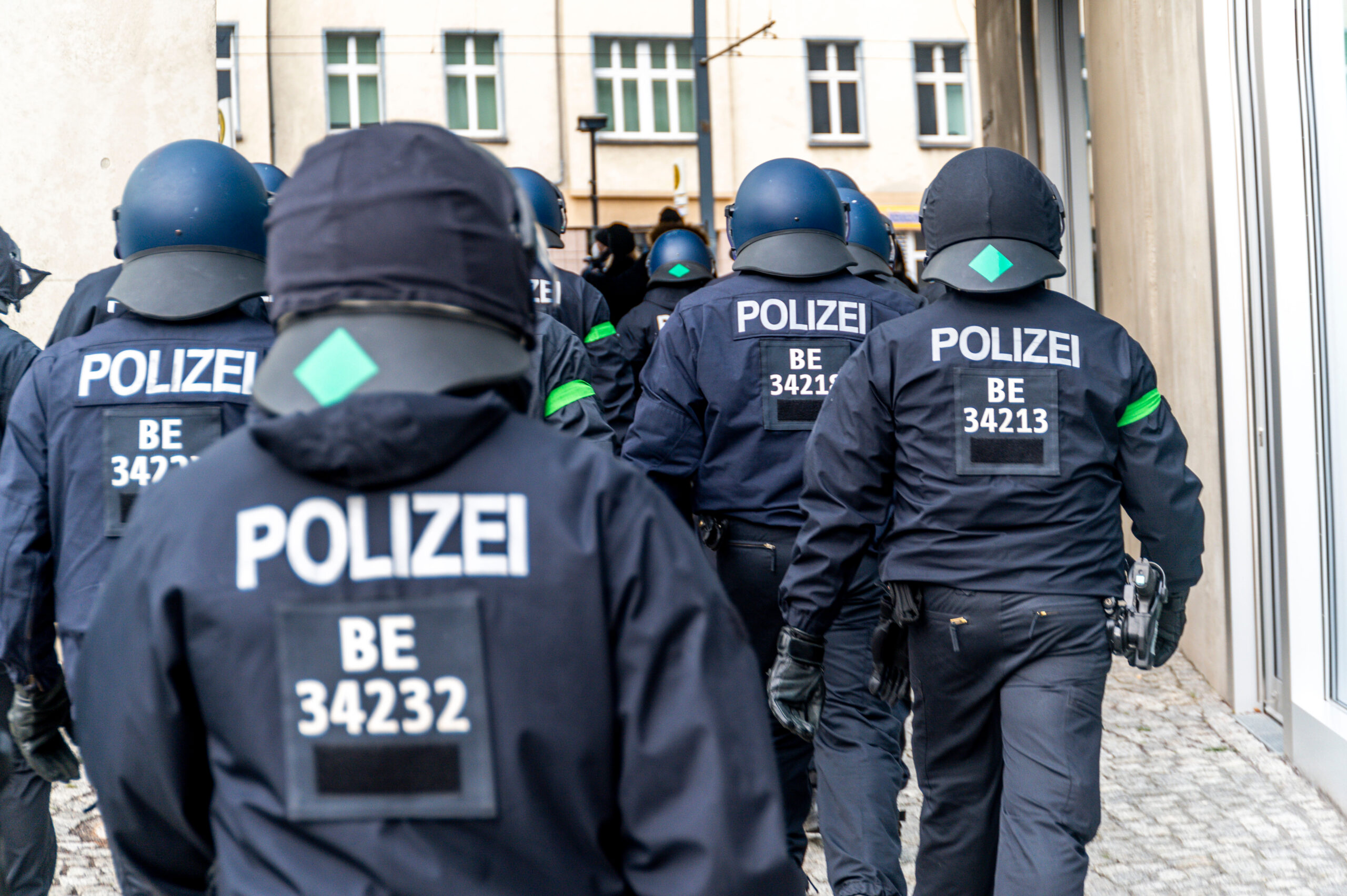
Nachdem Yuval am letzten Mittwoch an einer prozionistischen Diskussionsveranstaltung teilnahm, um dort antizionistisch zu intervenieren, wurde er von der Polizei angegriffen. Wir haben ihn dazu interviewt.
Anmerkung der Redaktion: Das Interview wurde auf Englisch geführt, untenstehend findet man den Originaltext.
Am 13. September waren Sie bei der Podiumsdiskussion von „Mythos#Israel1948“. Was war das für eine Veranstaltung, was hast du erwartet und was ist dort passiert?
Der Titel der Veranstaltung lautete „1948, israelbezogener Antisemitismus und die Zerstörung von Mythen über die Gründung Israels“.
Als ich die Einladung zu der Veranstaltung sah, auf deren linker Seite ein Symbol der israelischen Armee zu sehen war, war mir sofort klar, worum es ging.
Um etwas, das sehr weit von dem Wunsch entfernt ist, die Wahrheit zu erforschen, eher um etwas Halbakademisches, das wie Forschung aussieht und durch Interesse motiviert ist.
Ich bin nicht naiv und ich stellte mir vor, dass dort eine Nakba-Leugnung stattfinden würde, mit einer Wiederholung von Motiven, die ich aus meiner Kindheit in Israel gut kenne.
Warum bist du dorthin gegangen?
Gute Frage. Nun, nach der Lektüre des Textes und einer kurzen Recherche über die Mitglieder des Panels, sowie der Tatsache, dass diese Sache mit der Beteiligung der Gemeinde Neukölln organisiert wird, wurde mir klar, dass es für mich inakzeptabel wäre, diese Veranstaltung stattfinden zu lassen, ohne dass ich dabei bin, um die richtigen Fragen zu stellen.
Es geht um einen Wolf, der sich als Schaf verkleidet, eine scheinbar unschuldige Rede, die aber versucht, der Wahrheit Bedeutung zu nehmen.
Lass es mich so sagen: Die Nakba ist in jeder Hinsicht ein schockierendes Ereignis, fast das gesamte palästinensische Volk wurde in einem Moment aus seinen Häusern geworfen und einfach weggeblasen. Einige von ihnen wurden mit dem Schlüssel in der Hand zurückgelassen, während man ihnen versprach, dass sie nach dem Krieg zurückkehren könnten, was, wie wir wissen, nie geschah.
In einem Moment wurde fast ein ganzes Volk obdach- und mittellos, während jemand anderes dort lebt. Und jedes Mal, wenn sie versuchen, etwas zu sagen, wird ihnen der Holocaust vor die Nase gehalten, als ob es ihre Schuld gewesen wäre.
Als jemand, der in einer Familie aufgewachsen ist die gezwungen war einen Ort zu verlassen, den sie sehr geliebt hat, erscheint mir das verrückt. Das Schlimmste ist, dass es hier in Deutschland eine starke Tendenz gibt, diese Sache und diesen enormen Schmerz zu ignorieren.
Wir neigen dazu, alles mit dem Holocaust zu vergleichen und das ist eine Schande, denn der Holocaust war ein riesiges Verbrechen. Aber es gibt viele Verbrechen mit unterschiedlichem Schweregrad und allein die Tatsache, dass wir versuchen, eine Sache auf Kosten einer anderen zu verharmlosen, führt dazu, dass wir vieles übersehen.
Ein weiterer Hauptgrund, warum ich dort war, ist, dass ich das Gefühl hatte, dass diese Ereignisse nicht in diesem Raum enden, sondern sich fortsetzen in der Kriminalisierung aller, die pro-palästinensisch sind und in der Verweigerung unseres Rechts zu demonstrieren, während Lügen über uns verbreitet werden.
Wie bei den Veranstaltungen zum Gedenken an den Nakba-Tag im Mai denke ich, dass es damit zusammenhängt.
Eine weitere Sache, die mich schmerzt, ist, dass, während Energie auf diese müßigen Argumente verwendet wird, die wirkliche und wichtige Diskussion über den gegenwärtigen Antisemitismus und den Umgang mit ihm vergeudet wird. Er ist da, aber er scheint nur dann wichtig zu sein, wenn er mit dem Islam oder den Palästinenser:innen in Verbindung gebracht werden kann, und weniger, wenn man nach innen schauen muss.
Als du an der Diskussion teilgenommen hast, wurdest du von der Polizei angegriffen. Was hast du gesagt und wie haben Sie den Angriff gerechtfertigt?
Während ich mir die Argumente der Podiumsteilnehmer anhörte und mir Notizen machte, um am Ende Fragen stellen zu können, betrat plötzlich der Sicherheitsbeamte den Saal und sagte: „Draußen stehen zwei Polizisten, weil hier jemand Fotos macht.”
Ich schaute mich um und plötzlich sagte der Mann hinter mir: „Sie“.
Er behauptete, ich hätte mit meinem Handy ein Tonband aufgenommen, was ich auch tat. Aber ich denke nicht, dass ich mich dafür entschuldigen sollte. Mein Deutsch ist schlecht und ich nehme Dinge auf, um sie mir später anzuhören.
Sie baten uns, keine Fotos zu machen, weil das die Sicherheit der Podiumsteilnehmer gefährden könnte, also habe ich keine Fotos gemacht, sondern nur Ton aufgenommen.
Der Sicherheitsbeamte sagte mir, dass ich den Raum verlassen solle. Ich erwiderte, dass mir das rätselhaft vorkomme, aber er sah mich mit einem drohenden Blick an. Ich signalisierte zu kooperieren, beschloss jedoch, die wenigen Momente, die ich noch im Raum habe, zu nutzen, um zu sagen, was mir auf dem Herzen liegt. Dass sich das, was wir zuvor gehört hatten, meiner Meinung nach um Lügen handelt, die das Leiden der Palästinenser:innen schmälert. Dass es sich um Propaganda handelt und ich aus einer jüdisch-israelischen Familie stamme und der israelischen Armee gedient habe. Sowie, dass das Leiden der Palästinenser:innen real und alltäglich ist und nicht geleugnet werden kann. Ich beendete meine Rede und ging nach draußen. Sobald ich den Saal verließ, griffen mich zwei Zivilpolizisten an, einer von ihnen verband mir die Augen und der andere würgte mich gewaltsam. Ich flehte sie an, mich gehen zu lassen. Sagte, dass ich nicht atmen könne und keinen Widerstand leisten und gehen würde. Sie sagten, das wäre ihnen egal. Sie brachten mich in die Lobby des Lokals, wo sie mich auf den Boden warfen. Einer von ihnen legte sein Knie auf meinen Nacken (vermutlich in diesem Moment wurde meine Rippe verletzt) und sie legten mir Handschellen an. Sie teilten mir mit, dass ich verhaftet sei und brachten mich nach draußen, wo sie mich weiter schlugen; das kleine Video, welches aufgenommen wurde, ist von dort.
Nachdem sie dich angegriffen hatten, hielten sie dich über eine halbe Stunde lang fest. Wie ist das abgelaufen?
In dem Moment, in dem ich ins Auto gesetzt wurde, wurde mir klar, dass es eigentlich keinen Grund für meine Verhaftung gibt. Der Polizist, der dort war, war netter und bot an, mir die Handschellen abzunehmen, unter der Bedingung, dass ich mich gut benehme. Ich willigte ein. Ich bat darum, einen Anwalt zu sprechen, aber man sagte mir, das sei nicht nötig, da ich bald wieder freigelassen werde.
Etwa eine halbe Stunde später teilte man mir mit, dass ich freigelassen werde, und bat mich, bis morgen nicht in die Nähe dieser Kneipe zu gehen.
Ich frage mich immer noch – warum haben mich zwei Polizisten einfach so verprügelt und verhaftet? Obwohl ich mich überhaupt nicht gewehrt habe und es keinen Grund gab, mich zu verhaften. Im Gegenteil, ich bin selbständig und ohne Widerstand hinausgegangen.
In den sozialen Medien hast du geteilt, dass man dir eine Rippe gebrochen hat. Hast du noch andere Verletzungen und wie geht es dir jetzt?
Nach der Ultraschalluntersuchung ist es wahrscheinlich ein Riss.
Was auch immer es ist, ich konnte zwei Tagen nicht schlafen, weil ich mich vor Schmerzen winde, wenn ich mich hinlege. Und das alles, weil ich bei einer Podiumsveranstaltung über Antisemitismus teilnahm und versucht habe, meine Meinung zu sagen. Es ist auch deshalb so unangenehm, weil ich mir die Reaktionen der Leute ansehe, die dort waren, und es ist, als ob sie sich darüber freuen, dass ich geschlagen wurde. Auch während der Podiumsdiskussion höre ich antisemitische Phrasen wie: „Ich habe es satt, diese „Ich bin Jude“ Geschichten zu hören”, „Du armer Jude”, und jemand, der schnell auf mich zukam und schrie: „Halt die Klappe!” während ich sprach. Natürlich wurde dieser Mann nicht aus dem Raum geholt oder geschlagen, er war wahrscheinlich auf der „richtigen“ Seite. Die Wahrheit ist, dass mich dieses Gefühl am meisten ängstigt.
Was hältst du davon, dass die Stadt Berlin eine solche Veranstaltung ausrichtet? Wie ist es, als antizionistischer Jude unter einer solchen Regierung zu leben?
Es ist nicht einfach. Ich bin hierher gekommen mit einem sehr klaren Wissen darüber, was in Israel/Palästina passiert. Ich bin sehr eng mit meiner Großmutter aufgewachsen, einer italienischen Jüdin, die den Nazis mit Hilfe ihres zionistischen Onkels rechtzeitig entkommen konnte. Sie war neun Jahre alt, als sie in Palästina ankam und 18 Jahre alt, als die Nakba stattfand. Sie sprach immer so über die Nakba, dass es keinen Zweifel daran gab, bis zu ihrem letzten Tag. Als ich den Namen eines Ortes auf Hebräisch erwähnte, erinnerte sie mich an den früheren Namen auf Arabisch. Bei einer Veranstaltung wie dieser dabei zu sein und solch unverhohlene Lügen und Nakba-Leugnung zu hören, hat mich sehr verletzt. Zusätzlich zu der Tatsache, dass die Atmosphäre in Berlin nicht einfach ist, habe ich als Jude das Gefühl, dass für viele Deutsche – wenn ich nicht das vertrete, was von mir erwartet wird, nämlich meine Existenz als Jude zu vertreten, meine Meinung verurteilt wird. Und dass sie, wenn sie über Israel/Palästina sprechen, vergessen, dass es nicht um die Deutschen und ihre Schuld gegenüber den Jüd:innen geht, sondern um die Menschen, die dort leben, Palästinenser:innen und Jüd:innen. Palästinenser:innen leiden im Moment und kein Schmerz ist größer als der andere. Diese Veranstaltung war keine Diskussion, bei der man streiten oder widersprechen kann. Sie ist wie ein Finger in der Wunde für alle meine palästinensischen Freund:innen, die hier leben. Es ist so, als ob Ihr Schmerz und Ihre Familiengeschichte ausgelöscht werden und die Gemeinde dafür bezahlt. Es wird darüber gesprochen, als ob es sich um etwas Konzeptuelles handelt, das irgendwo dort zu finden ist, aber das ist es nicht, es ist hier und jetzt. Während wir sprechen, wurde über alle Palästinenser:innen in den Gebieten des Westjordanlandes eine Ausgangssperre verhängt, weil es der Vorabend des jüdischen Rosch Haschana ist. Jeden Tag höre ich von neuen Morden, die nie untersucht werden, von Gemeinden, die aus ihren Häusern vertrieben werden, von nächtlichen Einbrüchen in Häuser – das ist real.
Und in Deutschland, einem Ort, an dem ich mich sicher fühlen sollte, droht man mir, mich als antisemitisch zu bezeichnen, wenn ich Wörter wie „Apartheid“ oder „ethnische Säuberung“ erwähne.
Ich kenne das Judentum so, dass dies seine Essenz ist: nach dem Guten und Gerechten zu suchen und zu versuchen, es zu erreichen, auch wenn es einen Preis hat.
Original:
On 13.09. you went to the panel discussion of “Mythos#Israel1948”. What kind of an event is that and what did you expect to happen there?
The title of the event was „1948, Israeli related anti-Semitism and shattering myths about the founding of Israel“
As soon as I saw the invitation for the event, on the left side of which there is a symbol of the Israeli army, I understood what it was about.
Something that is very far from the desire to reach truth research, but more like something semi-academic that motivates something that looks like research and is motivated by interest.
Unfortunately, I’m no longer naive, and I imagined that I may find there a Nakba denial, with a repetition of motifs that I know well from my childhood in Israel.
Why did you go there?
Good question, I’m laughing and my rib hurts.
Well, from reading the text and a short research about the members of the panel, in addition to the fact that this thing is organized with the participation of the municipality of Neukölln,
I realized that letting this thing go without me being there to ask the right questions, would be, for me, unacceptable.
It is about a wolf disguised as a sheep, this seemingly innocent speech, but which tries to take meaning from the truth.
I’ll tell you something, the Nakba, is a shocking event on every level, almost the entire Palestinian people were thrown out of their homes in one moment, and were simply blown away, some of them were left with the key in their hand, while they were promised that after the war they would return, which as we know never happened.
In one moment, almost an entire people found themselves homeless and destitute, when someone else lives there, and every time they try to say something, the holocaust is pulled in front of them, as if it were their fault.
As someone who grew up in a family that was forced to leave a place they loved very much, It seems crazy to me, and the hardest thing is that here in Germany there is a strong tendency to ignore this thing and this enormous pain, as if it is of no interest.
We have a tendency to compare everything to the holocaust, and it’s a shame, because the holocaust was a huge crime in magnitude, but there are many crimes, of varying degrees of severity, and the very fact that we try to dwarf one thing at the expense of another, it causes us to miss a lot.
Another of the main reasons I went there, is that I felt that these events do not end in this room, but continue to the criminalization of anyone who is pro-Palestinian, and the denial of our right to demonstrate while spreading lies about us.
As happened in the events commemorating Nakba Day in May, I think it is related to that.
Another thing that pains me is that while energy is spent on these idle arguments, the real and important discussion about contemporary anti-Semitism and how to deal with it is wasted, it is there, but it seems to be important only when it can be associated with Islam or to the Palestinians, and less so when you have to look inside.
As you were taking part in the discussion, you were attacked by the police. What did you say and how did they justify the attack?
While I was listening to the hard-of-hearing arguments of the panel participants, and taking notes so that I could ask questions at the end, the security man suddenly entered the hall and said: There are two police outside because there is someone here taking pictures.
I looked around and suddenly the guy behind me said „you“
He claimed that I was recording an audio tape with my phone, which I did but I don’t think I should apologize for it. My German is messed up and I record things to listen to later.
They asked us not to take pictures because it would may “risk” the safety of the panel members, so I did not take pictures, but only recorded audio,
The security man told me that I should leave the room, I said that it seemed puzzling to me, but he looked at me with a threatening look, I agreed, I decided to take advantage of the few moments that I am in the room to say what is on my heart, which in my opinion on what we just listened to, that I think they are lies that diminish the Palestinian suffering, that it behaves like propaganda, that I come from a Jewish and Israeli family and that I served in the Israeli army, and that the suffering of the Palestinians is solid, real, everyday and cannot be denied.
I finished my speech and went outside, as soon as I left the hall, two undercover policemen attacked me, one of them blindfolded me, and the other strangled me forcefully, I begged them to leave me, I said that I was neither breathing nor resisting, that I would go wherever they told me, but it didn’t matter to them.
They took me to the lobby of the pub, and there they threw me to the floor while one of them had their knee on my neck (apparently that’s where I damaged my rib) and when they handcuffed me tightly. They informed me that I was under arrest and they took me outside where they continued to beat me, the little video that was taken is from there.
After they attacked you, they detained you for over half an hour. How did that go?
From the moment I was put in the car I realized that I was actually being arrested for nothing, the policeman who was there was nicer and agreed to take the handcuffs off me on the condition that I behaved well, I agreed.
I asked to speak to a lawyer but was told that there was no need because I would soon be released.
About half an hour later they told me I was released and asked me not to go near this pub until tomorrow.
I’m still asking, if I did not resist at all, and there was no reason to arrest me because I did not commit any crime, on the contrary, I walked out on my feet and without resistance.
Why did two policemen just beat me up and arrest me like that?
On social media you stated that they broke your rib. Do you suffer from any other injuries and how do you feel now?
Actually, after the ultrasound, it’s probably a crack.
Whatever it is, I haven’t been able to sleep for two days because I’m writhing in pain when I lie down.
And all this because I sat on a panel about anti-Semitism and tried to express my opinion.
It’s also mostly unpleasant, because I look at the reactions of people who were there, and it’s like there’s joy in the fact that I was beaten,
And also during the panel to hear anti-Semitic phrases like: I’m tired of hearing these „I’m Jewish“ stories, ״Du armer Jude״, and someone who quickly approached me and screamed: Shut up! while I was speaking.
Needless to say, this man was not taken out of the room or beaten, he was probably on the right side.
The truth is that this is the feeling that scares me the most.
What do you think about the City of Berlin hosting such an event? How does it feel living as an anti-zionist Jew under such a government?
It is not easy, I came here with a very clear knowledge of what is happening in Israel/Palestine,
I grew up very close to my grandmother, an Italian Jew who, with the help of her Zionist uncle, escaped the Nazis in time.
She was 9 years old when she arrived in Palestine and 18 years old at the time of the Nakba.
She always talked about the Nakba in such a way that there was no doubt about this, until her last day when I would mention the name of a place in Hebrew, she would remind me of its previous name in Arabic.
To sit in such an event like this and hear such blatant lies and Nakba denial , hurt me a lot.
In addition to the fact that the atmosphere in Berlin is not easy, as a Jew I feel that for many Germans – if I do not represent what is expected of me to represent my existence as a Jew becomes a disturbance in space, my opinion is condemned.
And that when they talk about Israel/Palestine, they forget that the issue is not the Germans and their guilt towards the Jews, the issue is with the people who live there, Palestinians and jews, Palestinians are suffering right now and no pain is bigger than the other.
And this event, it was not a discussion, where you can argue or contradict, we saw what happened to those who did not agree, this discussion is like a finger in the eye for all my Palestinian friends who live here, it is as if your pain and family history are being erased and the municipality is paying for it.
This is being talked about as if it is something conceptual, which is found somewhere there, but it is not, it is here and now, as we speak, a lockdown has been imposed on all Palestinians in the West Bank territories, because it is the eve of the Jewish Rosh Hashanah,
Every day I hear about new killings that will never be investigated, communities that are evicted from their homes, night break-ins into homes, this is real.
And in Germany, a place where I should feel safe, I am threatened with being called anti-Semitic when I mention words like „apartheid“ or „ethnic cleansing.“
I know Judaism in such a way that this is its essence, to search for the good and the just and try to achieve it, even if it comes at a price.
